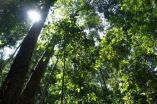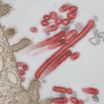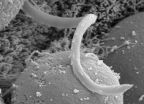(Press-News.org) A team of scientists has found that the woody growth of forests in north Borneo is half as great again as in the most productive forests of north-west Amazonia, an average difference of 3.2 tons of wood per hectare per year.
The new study, published today in the Journal of Ecology, examined differences in above-ground wood production (one component of the total uptake of carbon by plants) which is critically important in the global cycling of carbon.
Trees are taller for a given diameter in Southeast Asia compared with South America, meaning they gain more biomass per unit of diameter growth, and this in part explains the differences observed.
The research team also discovered that trees in north Borneo belonging to the family Dipterocarpaceae (or dipterocarps, translating literally to "winged seeds"), which grow to giant sizes, produced wood faster than neighbouring trees of other families, or any trees in the Amazonian sites.
Whilst regional variation in wood production rates has been suspected, this research, carried out by an international collaboration of scientists from the UK, Asia, South America and USA, is the first to use identical methods in Amazonia and Borneo to measure properties of both the forests and their soils, making robust comparisons among different continents possible for the first time.
The two regions were compared as they are climatically similar with no annual dry season, and each region has a range of soil conditions, meaning the primary difference between them is the different tree species that happen to exist in each region.
Above-ground wood production is the amount of biomass gained in the woody parts of a tree. It can be estimated from repeated measures of tree diameter and estimates of wood density and tree height. The study examined data from 26 hectares of forest and 12,000 trees which have been monitored for more than twenty years.
Lead author Dr Lindsay Banin from the UK's Centre for Ecology & Hydrology said, "In Borneo, dipterocarps – a family of large trees with winged seeds - produce wood more quickly than their neighbours. This means that they have evolved something special and unique - what exactly this is remains a mystery. Dipterocarps are known to make special relationships with fungi in the soil, so they may be able to tap into scarce nutrient resources. Or, they may be trading-off growth of other plant parts."
Co-author Professor Oliver Phillips from the University of Leeds said, "One big question in ecology is whether plant species composition matters at all to fundamental ecosystem functions such as productivity, or carbon storage. The fact that dipterocarp-dominated forests achieve faster wood growth than even the most diverse forests in the Amazon shows that the random evolutionary histories of continents can determine their whole ecology. Identity really does matter."
With growing global datasets collected using standardised methods, further comparisons will be possible across the tropics to help elucidate the nature and causes of variation in plant biomass growth. Understanding variation in the capacity for forests to store and sequester carbon is vitally important for managing them best to keep carbon out of the atmosphere.
INFORMATION: END
Super-charged tropical trees of Borneo vitally important for global carbon cycling
2014-05-09
ELSE PRESS RELEASES FROM THIS DATE:
Exact outline of melanoma could lead to new diagnostic tools, therapies
2014-05-09
CORVALLIS, Ore. – Researchers at Oregon State University have identified a specific biochemical process that can cause normal and healthy skin cells to transform into cancerous melanoma cells, which should help predict melanoma vulnerability and could also lead to future therapies.
More than 70,000 cases of melanoma, the deadliest form of skin cancer, develop in the U.S. every year.
The work was published today in PLoS Genetics, in work supported by the National Institutes of Health.
"We believe this is a breakthrough in understanding exactly what leads to cancer ...
IL-27 balances the immune response to influenza and reduces lung damage
2014-05-09
Highly pathogenic (dangerous) influenza strains elicit a strong immune response which can lead to uncontrolled inflammation in the lung and potentially fatal lung injury. A study published on May 8th in PLOS Pathogens demonstrates the importance of IL-27 for the control of immunopathology—damage to the lung tissue caused by the immune system—and the therapeutic potential of well-timed IL-27 application to treat life-threatening inflammation during lung infection.
Alf Hamann, from Deutsches Rheuma-Forschungszentrum and Charité Universitätsmedizin Berlin, Germany, and colleagues, ...
SOCS4 prevents a cytokine storm and helps to clear influenza virus from the lung
2014-05-09
Certain influenza strains are highly virulent—they cause more serious disease and kill more people. Some of the damage is caused by the stronger immune response such strains elicit, especially in the lung. A study published on May 8th in PLOS Pathogens identifies SOCS4 as a key regulator of the immune response against influenza virus.
Lukasz Kedzierski, Sandra Nicholson, and colleagues from the Walter and Eliza Hall Institute of Medical Research and the University of Melbourne, Australia, studied mice with a mutation in the Socs4 gene, a member of a gene family whose ...
An extra doctor visit may help prevent rehospitalization of kidney failure patients
2014-05-09
Washington, DC (May 8, 2014) — More frequent face-to-face physician visits in the month following hospital discharge may help reduce a kidney failure patient's chances of needing to be sent back to the hospital. That's the conclusion of a study appearing in an upcoming issue of the Journal of the American Society of Nephrology (JASN). The study also found that closer outpatient monitoring of kidney failure patients following hospital discharge could cut health care costs significantly.
A major goal of health policy reform has been to reduce hospital readmissions within ...
Neurovance's EB-1020 SR for adult ADHD shows stimulant-like efficacy in Phase 2a trial
2014-05-09
Neurovance, Inc. today announced complete results from its phase 2a pilot study of EB-1020 SR, a non-stimulant, in adult male patients with all subtypes of ADHD (attention deficit hyperactivity disorder). EB-1020 SR is a norepinephrine- and dopamine-preferring triple reuptake inhibitor. The data showed a statistically significant improvement in ADHD symptoms on the ADHD-Rating Scale-IV (ADHD-RS-IV), the primary outcome measure, in a range similar to that reported in previously published trials with stimulants. EB-1020 SR appears to be well tolerated at the doses studied. ...
Ending the perfect storm: Protein key to beating flu pandemics
2014-05-09
VIDEO:
A protein called SOCS4 has been shown to act as a handbrake on the immune system's runaway reaction to flu infection, providing a possible means of minimising the impact of...
Click here for more information.
A protein called SOCS4 has been shown to act as a handbrake on the immune system's runaway reaction to flu infection, providing a possible means of minimising the impact of flu pandemics.
Scientists from Melbourne's Walter and Eliza Hall Institute have found that ...
Lethal parasite evolved from pond scum
2014-05-09
A genomic investigation by University of British Columbia researchers has revealed that a lethal parasite infecting a wide range of insects actually originated from pond scum, but has completely shed its green past on its evolutionary journey.
A team led by UBC Botany Prof. Patrick Keeling sequenced the genome of Helicosporidium – an intracellular parasite that can kill juvenile blackflies, caterpillars, beetles and mosquitoes – and found it evolved from algae like another notorious pathogen: malaria.
Keeling and colleagues had previously reported that malaria shared ...
Eating more fruits, vegetables may cut stroke risk worldwide
2014-05-08
Eating more fruits and vegetables may reduce the risk of stroke worldwide, according to new research in the American Heart Association's journal Stroke.
Researchers conducted a meta-analysis of 20 studies published over the last 19 years to assess the effects of fruit and vegetable consumption on risk of stroke globally. The combined studies involved 760,629 men and women who had 16,981 strokes.
Stroke risk decreased by 32 percent with every 200 grams of fruit consumed each day and 11 percent with every 200 grams of vegetables consumed each day.
"Improving diet and lifestyle ...
Common test used on heart patients who need defibrillator implants unnecessary: Study
2014-05-08
Hamilton, ON (May 8, 2014) – New research from McMaster University suggests that a commonly performed test during certain types of heart surgery is not helpful and possibly harmful.
The testing procedure, known as defibrillator testing (DT), is commonly used on people who require implantable cardioverter-defibrillators (ICDs) to prevent sudden cardiac death. It involves putting the patient into cardiac arrest to determine if the defibrillator can first recognize, then successfully shock the patient back into a normal heart rhythm. It requires the use of general anesthesia ...
Study confirms mitochondrial deficits in children with autism
2014-05-08
(SACRAMENTO, Calif.) — Children with autism experience deficits in a type of immune cell that protects the body from infection. Called granulocytes, the cells exhibit one-third the capacity to fight infection and protect the body from invasion compared with the same cells in children who are developing normally.
The cells, which circulate in the bloodstream, are less able to deliver crucial infection-fighting oxidative responses to combat invading pathogens because of dysfunction in their tiny energy-generating organelles, the mitochondria.
The study is published ...






